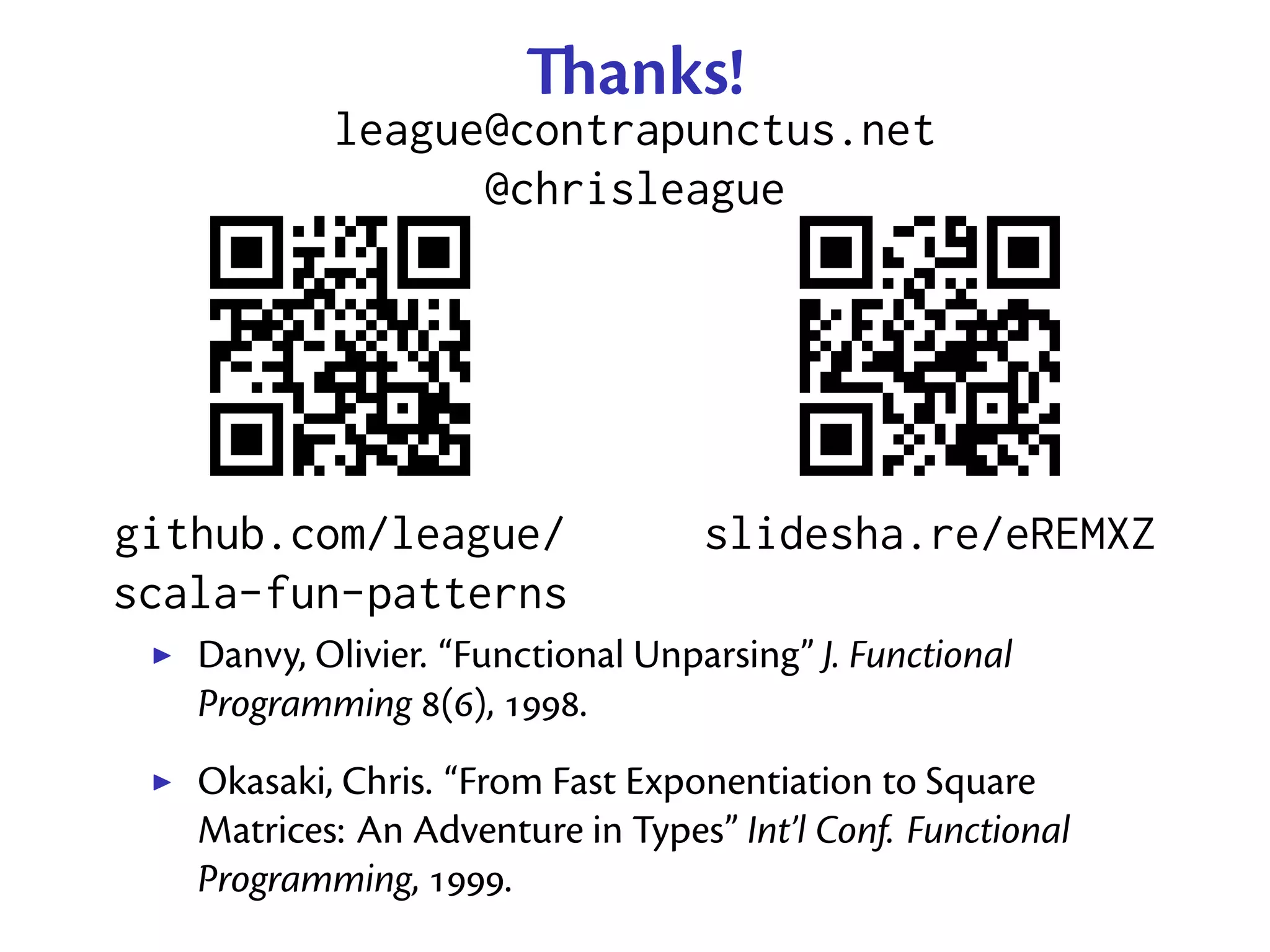This document discusses three functional patterns: continuations, format combinators, and nested data types. It provides examples of each pattern in Scala. Continuations are represented using explicit continuation-passing style and delimited control operators. Format combinators represent formatted output as typed combinators rather than untyped strings. Nested data types generalize recursive data types to allow the type parameter of recursive invocations to differ, as in square matrices represented as a nested data type. The document concludes by drawing an analogy between fast exponentiation and representing square matrices as a nested data type.
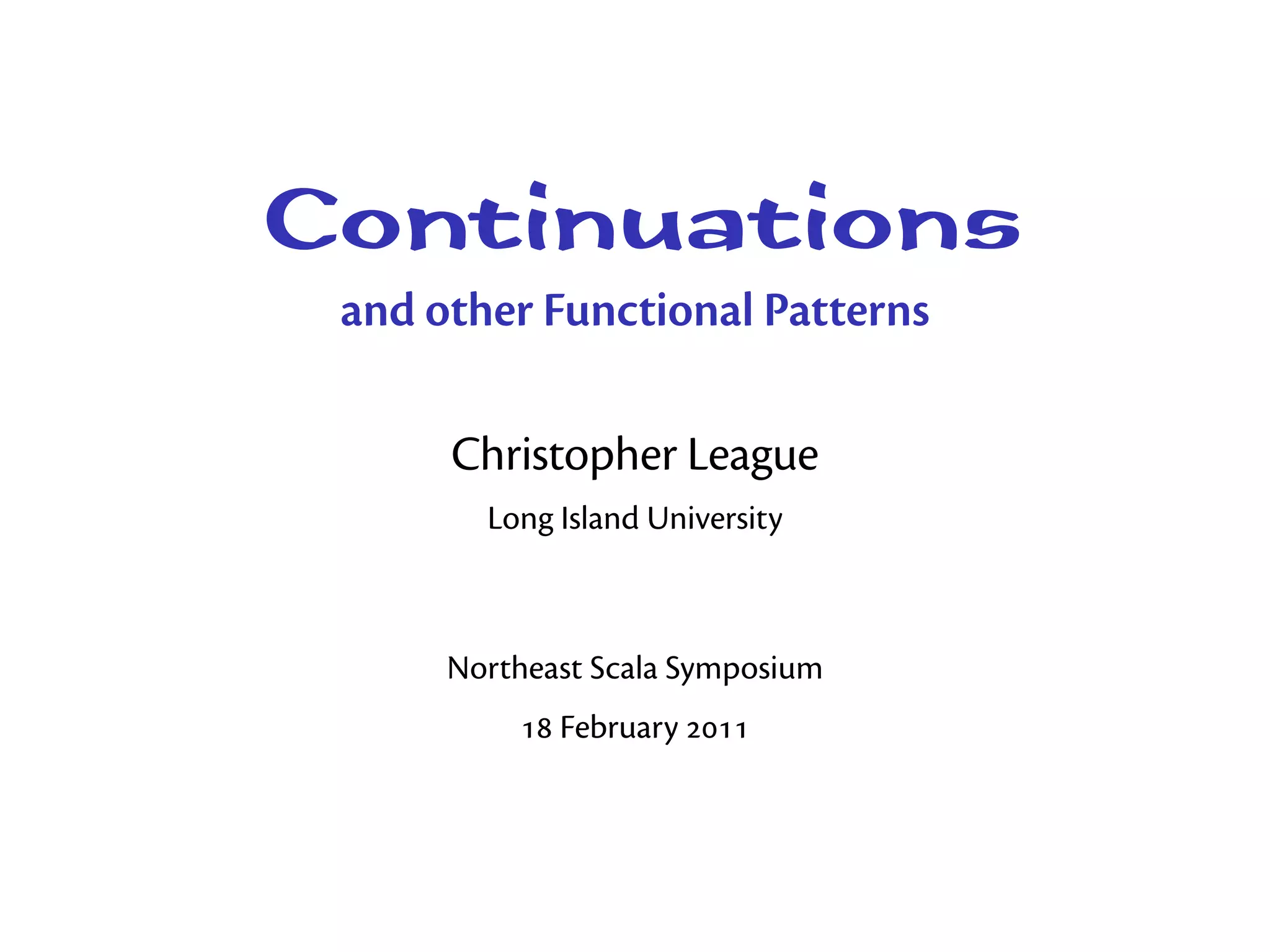
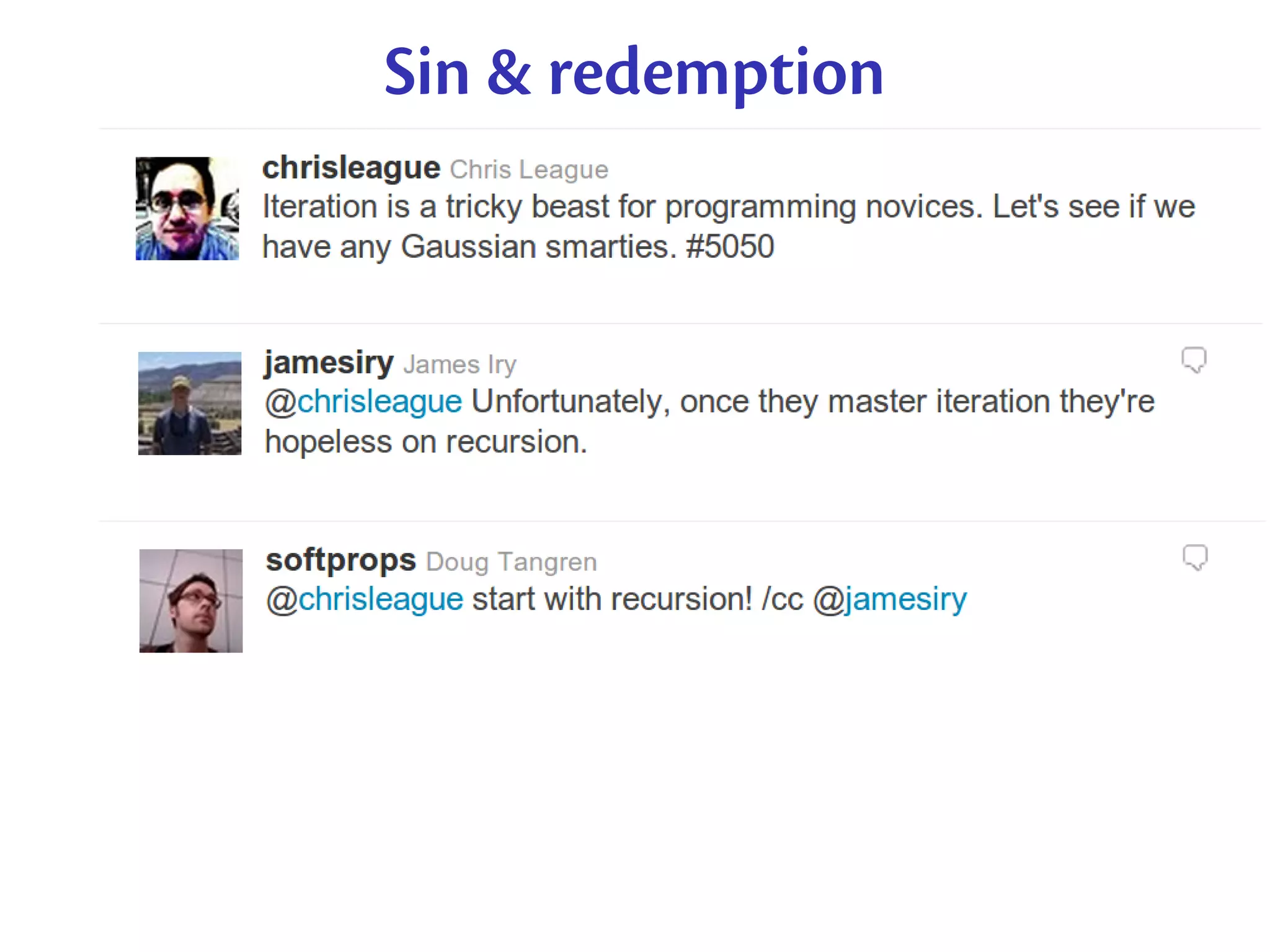
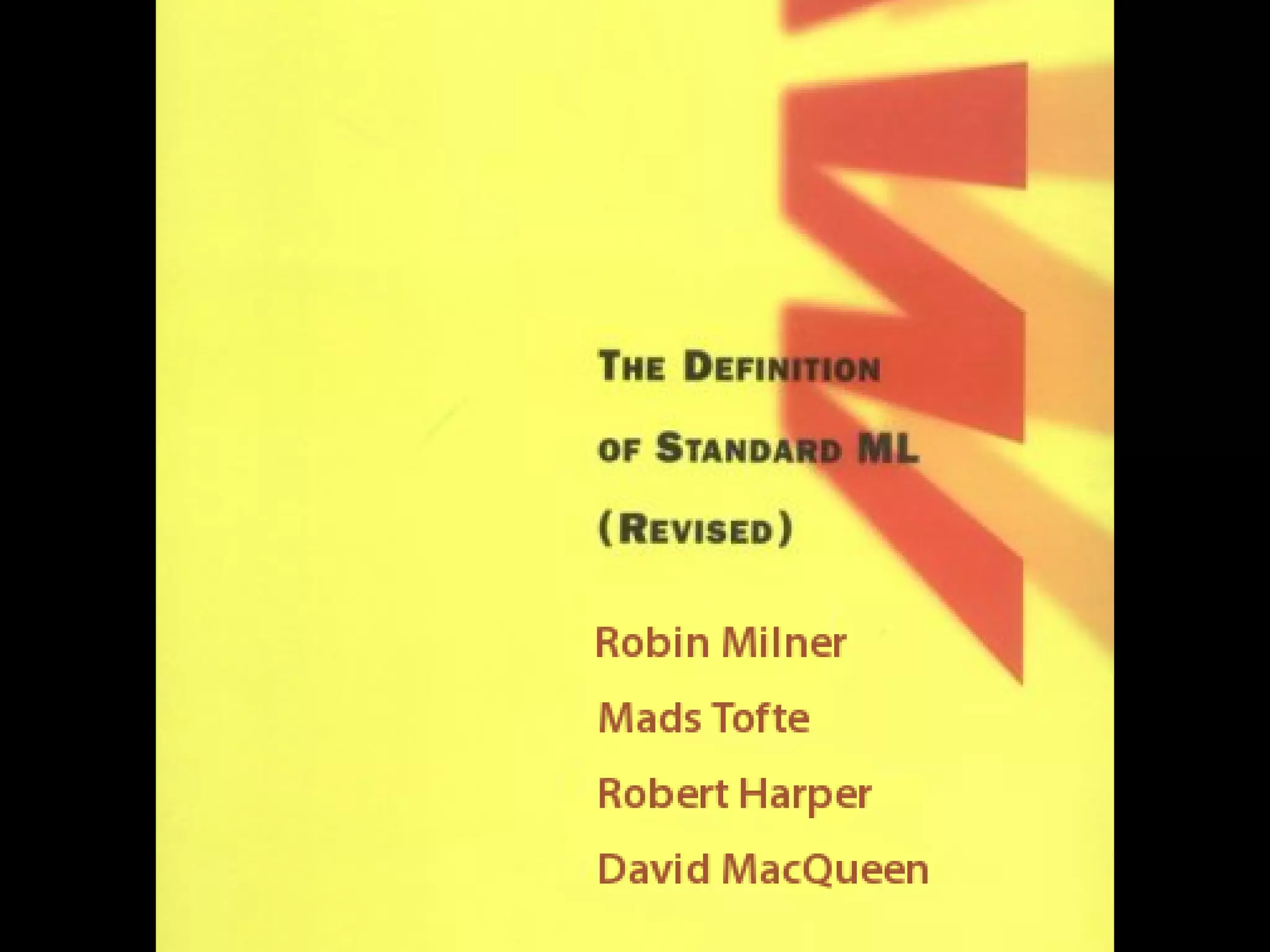
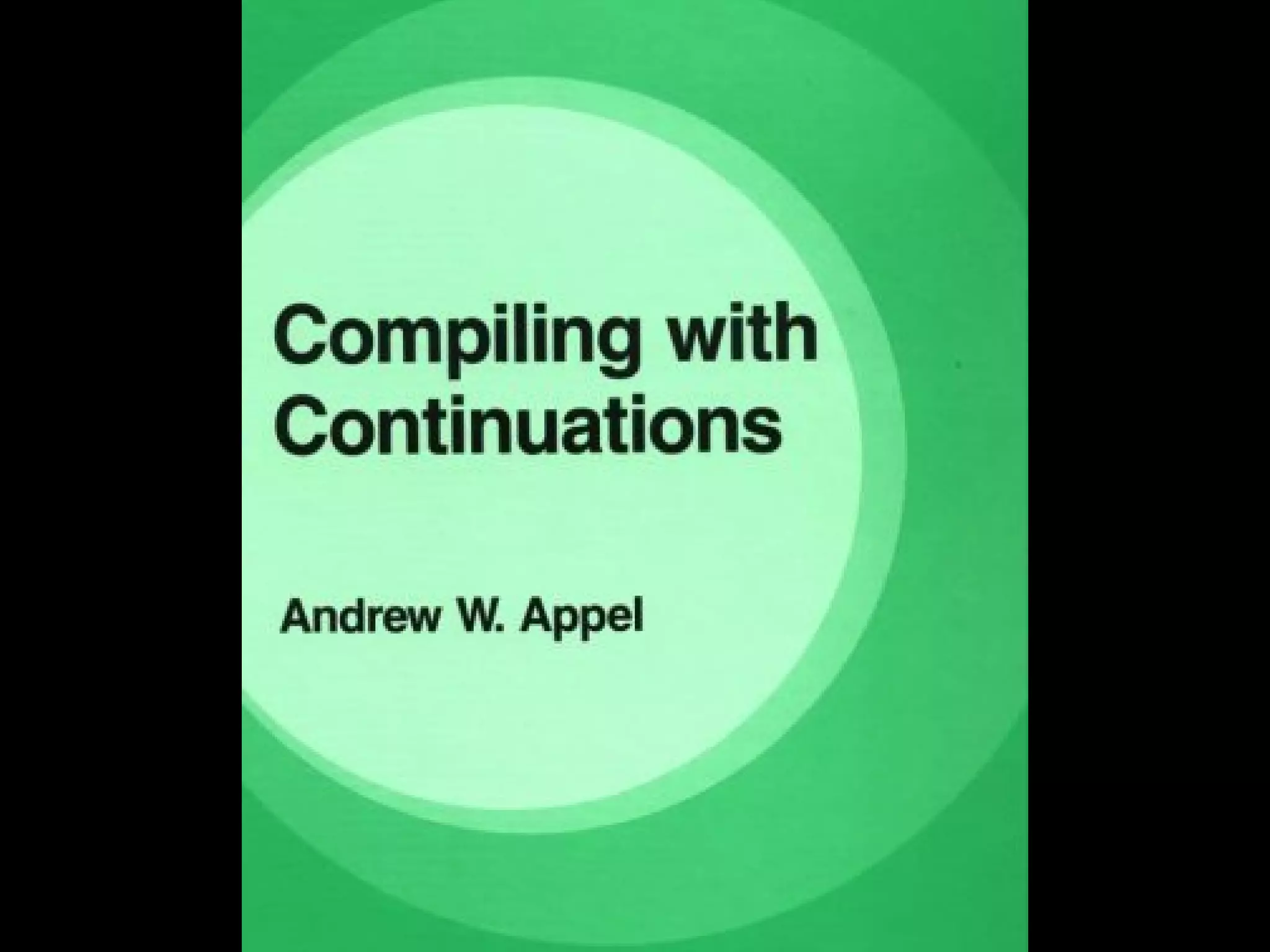
![Java classes → SML runtime
Standard ML of New Jersey v110.30 [JFLINT 1.2]
- Java.classPath := [”/home/league/r/java/tests”];
val it = () : unit
- val main = Java.run ”Hello”;
[parsing Hello]
[parsing java/lang/Object]
[compiling java/lang/Object]
[compiling Hello]
[initializing java/lang/Object]
[initializing Hello]
val main = fn : string list -> unit
- main [”World”];
Hello, World
val it = () : unit
- main [];
uncaught exception ArrayIndexOutOfBounds
raised at: Hello.main([Ljava/lang/String;)V
- ˆD](https://image.slidesharecdn.com/slides-110216164220-phpapp01/75/Scala-Functional-Patterns-5-2048.jpg)
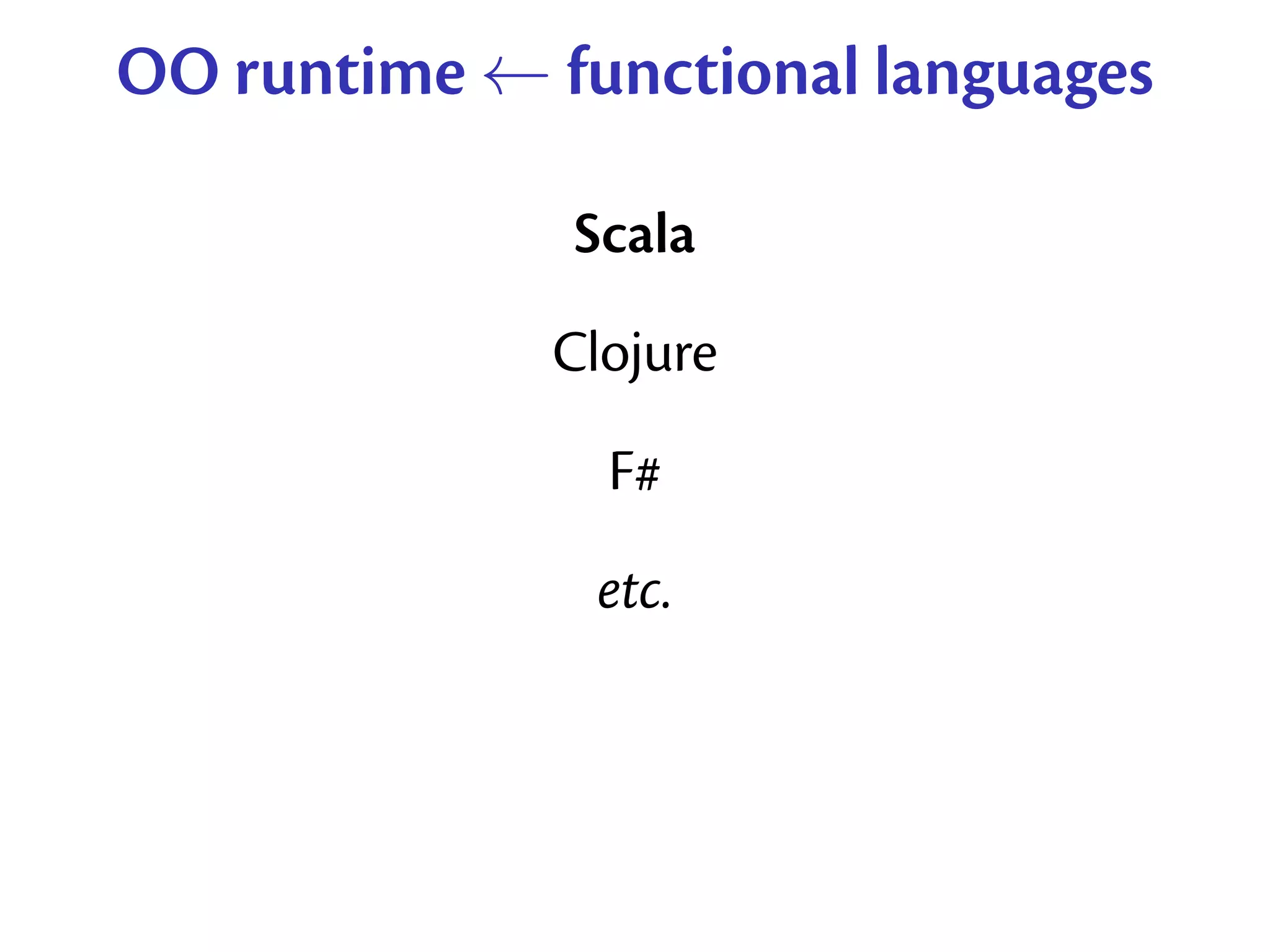
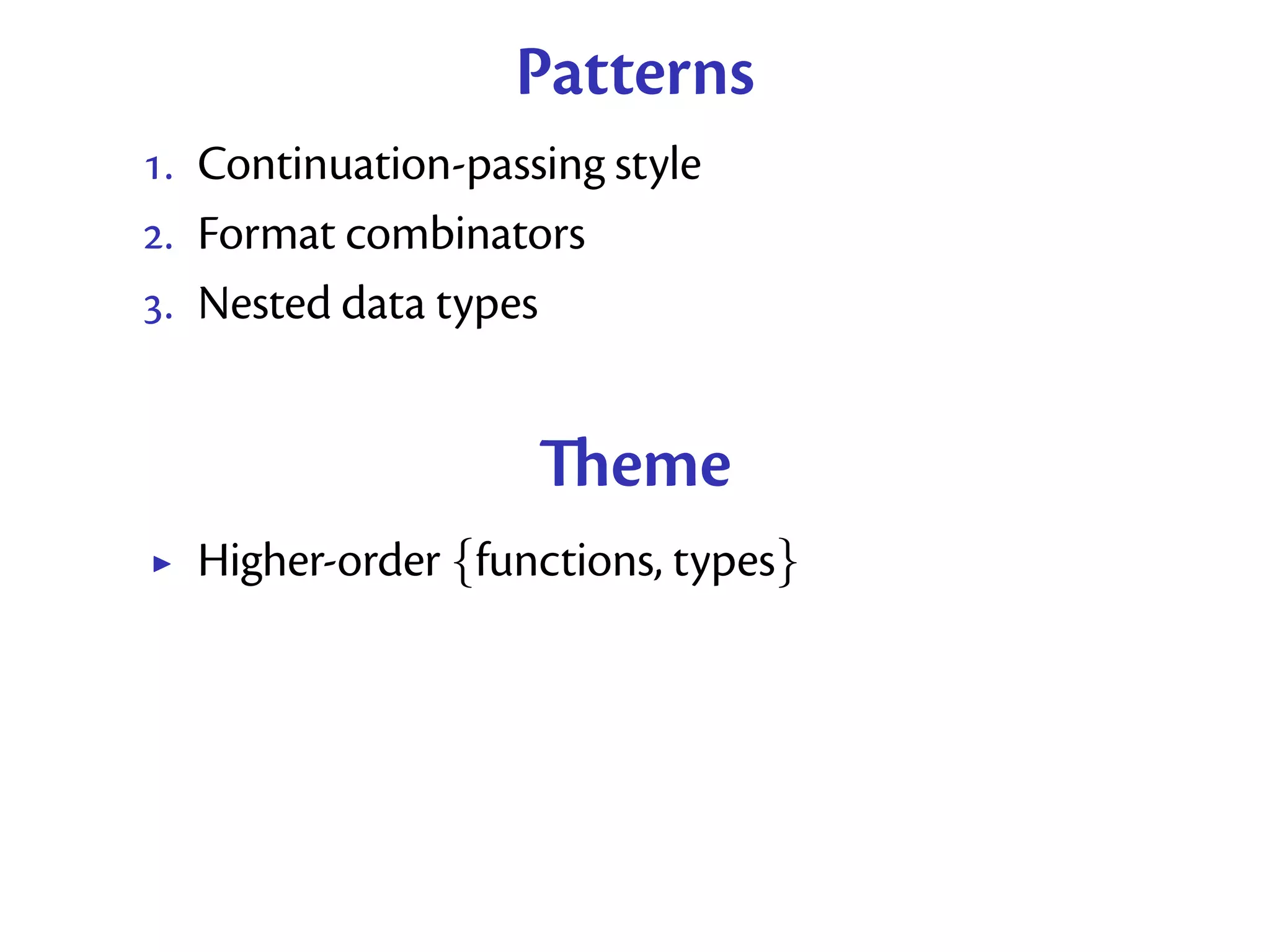
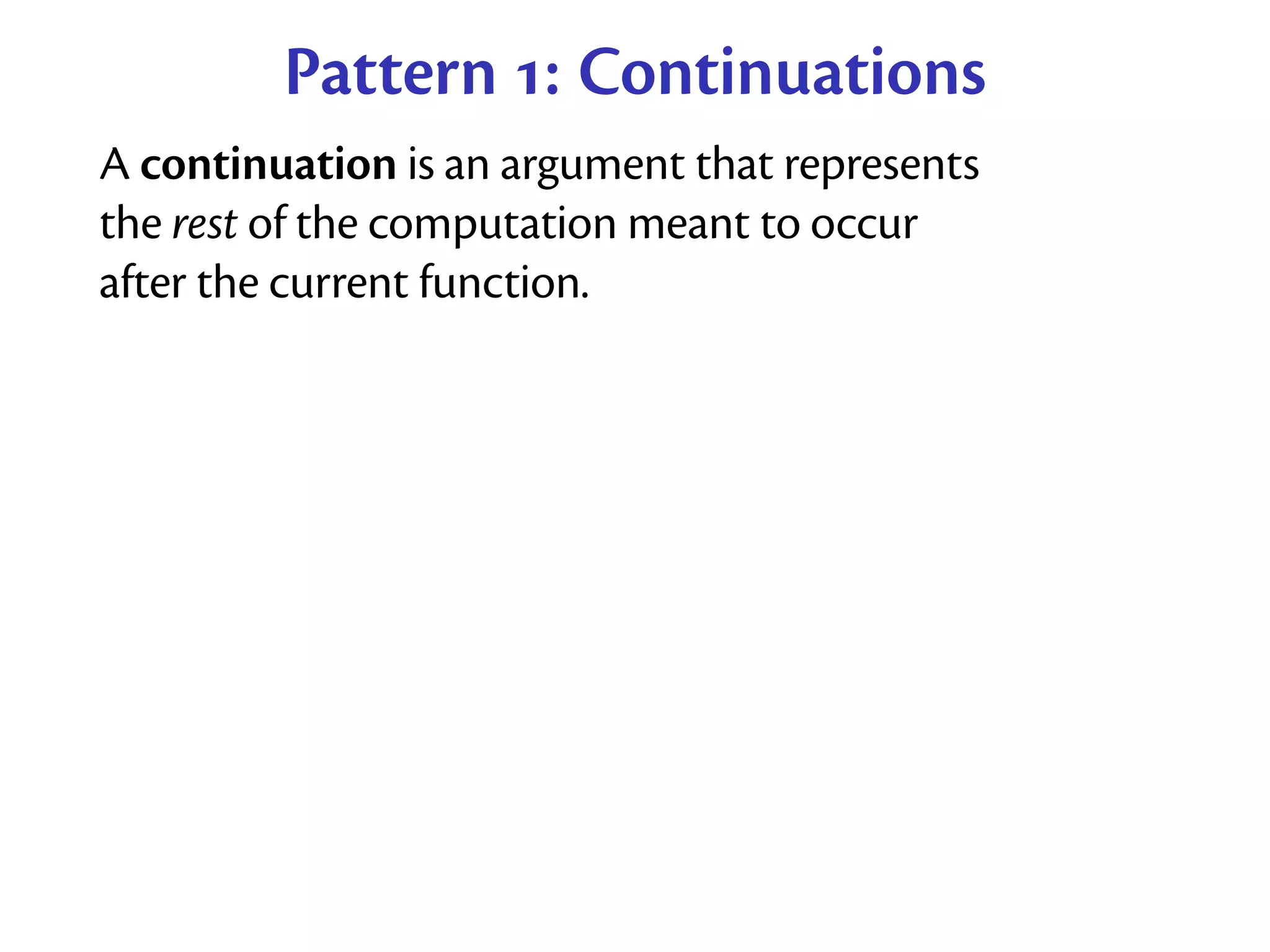
![Explicit continuations – straight-line
def greeting [A] (name: String) (k: => A): A =
printk(”Hello, ”) {
printk(name) {
printk(”!n”)(k)
}}
def printk [A] (s: String) (k: => A): A =
{ Console.print(s); k }
scala> greeting(”Scala peeps”) { true }
Hello, Scala peeps!
res0: Boolean = true](https://image.slidesharecdn.com/slides-110216164220-phpapp01/75/Scala-Functional-Patterns-9-2048.jpg)
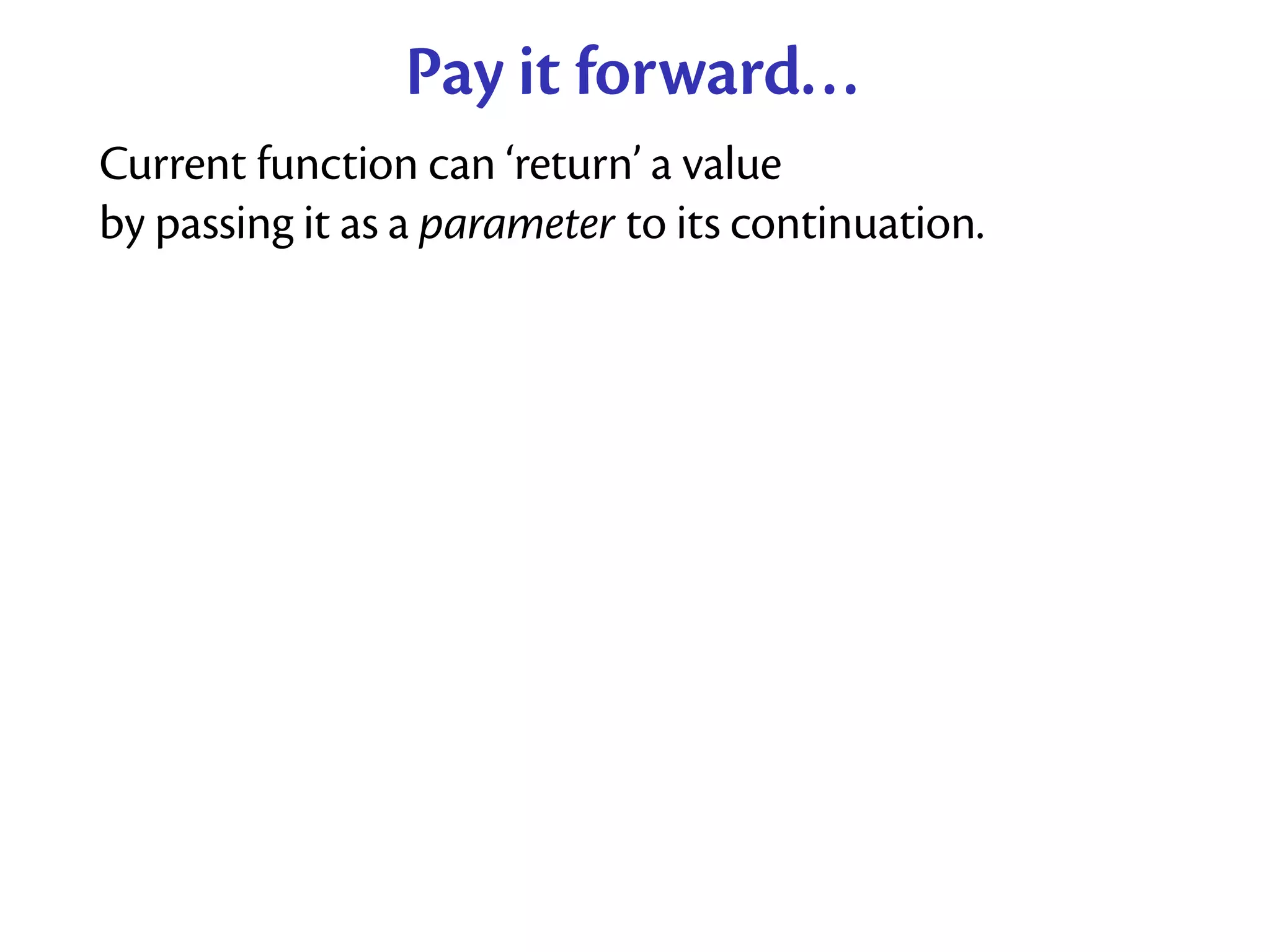
![Explicit continuations – return values
def plus [A] (x: Int, y: Int) (k: Int => A): A =
k(x+y)
def times [A] (x: Int, y: Int) (k: Int => A): A =
k(x*y)
def less[A] (x: Int, y: Int) (kt: =>A) (kf: =>A):A =
if(x < y) kt else kf
def test[A](k: String => A): A =
plus(3,2) { a => times(3,2) { b =>
less(a,b) {k(”yes”)} {k(”no”)} }}
scala> test{printk(_){}}
yes](https://image.slidesharecdn.com/slides-110216164220-phpapp01/75/Scala-Functional-Patterns-11-2048.jpg)
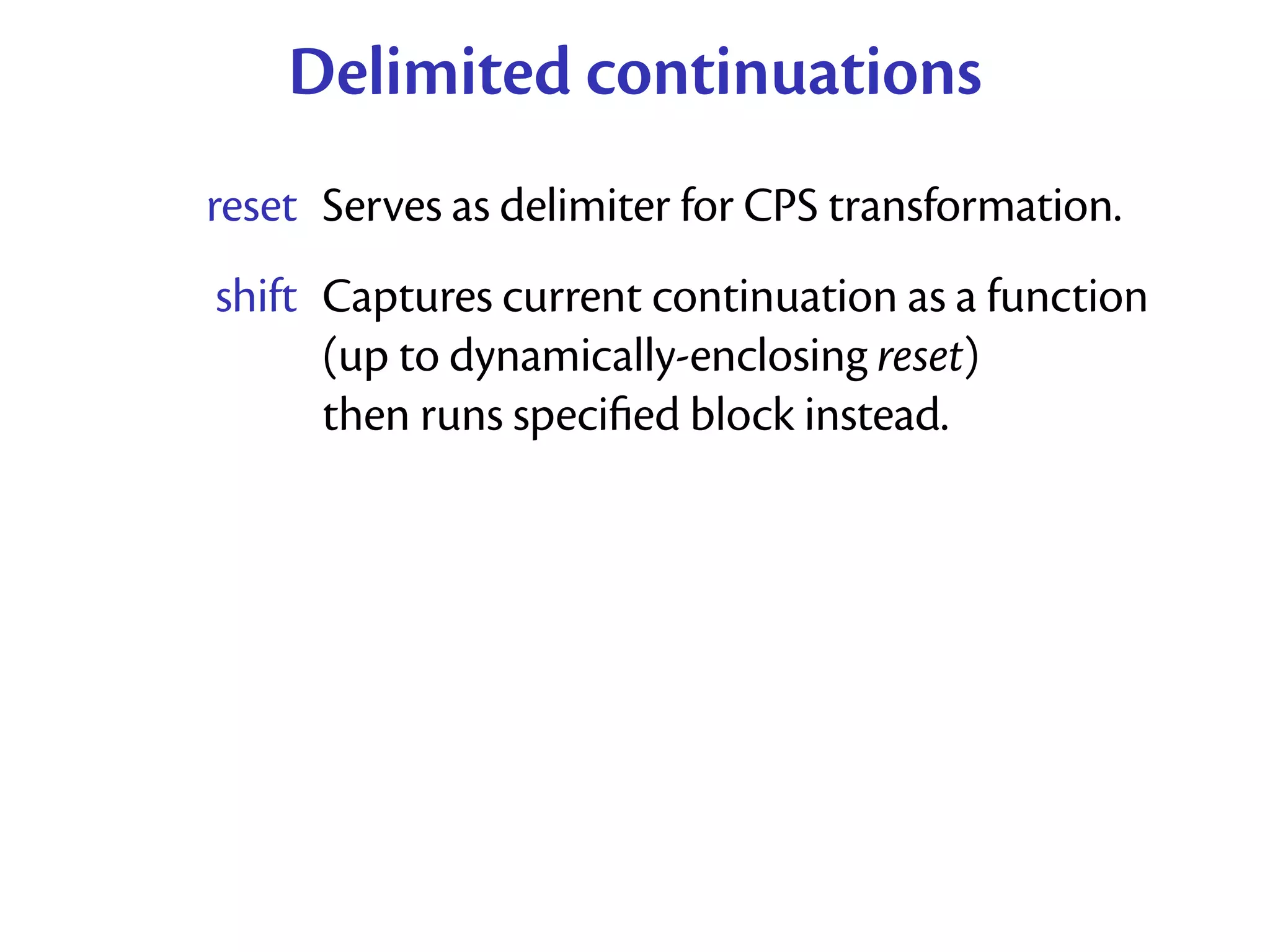
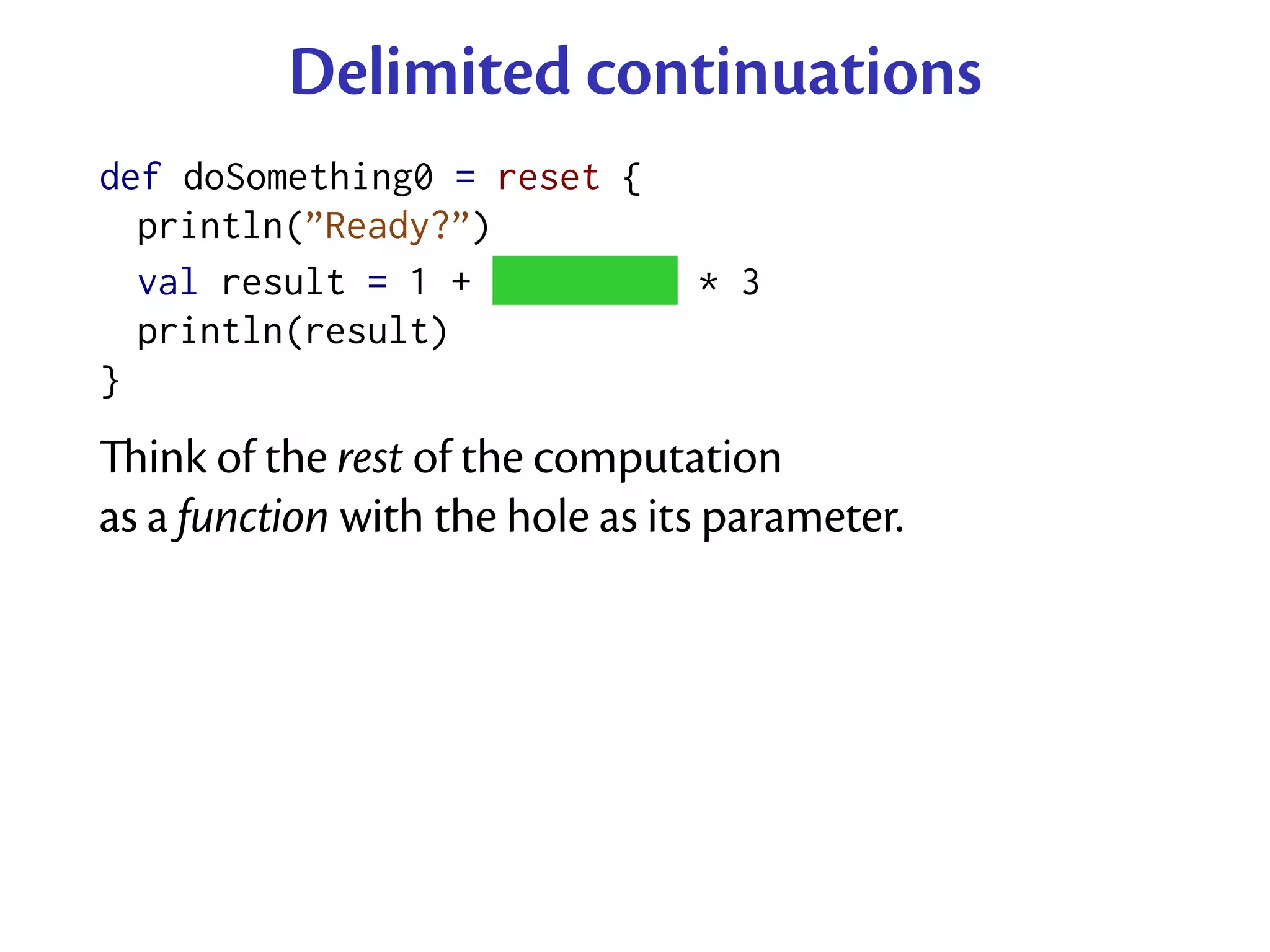
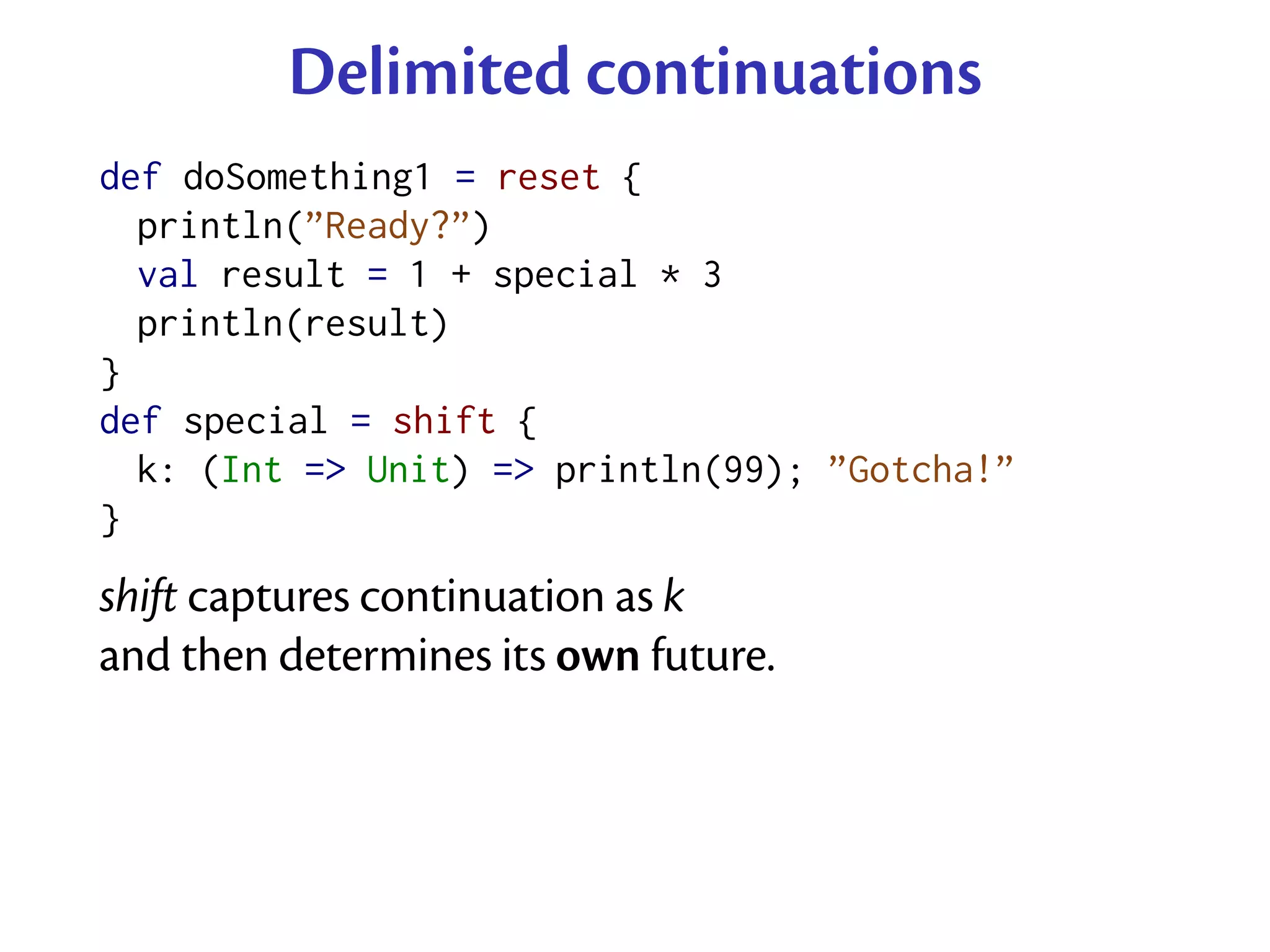
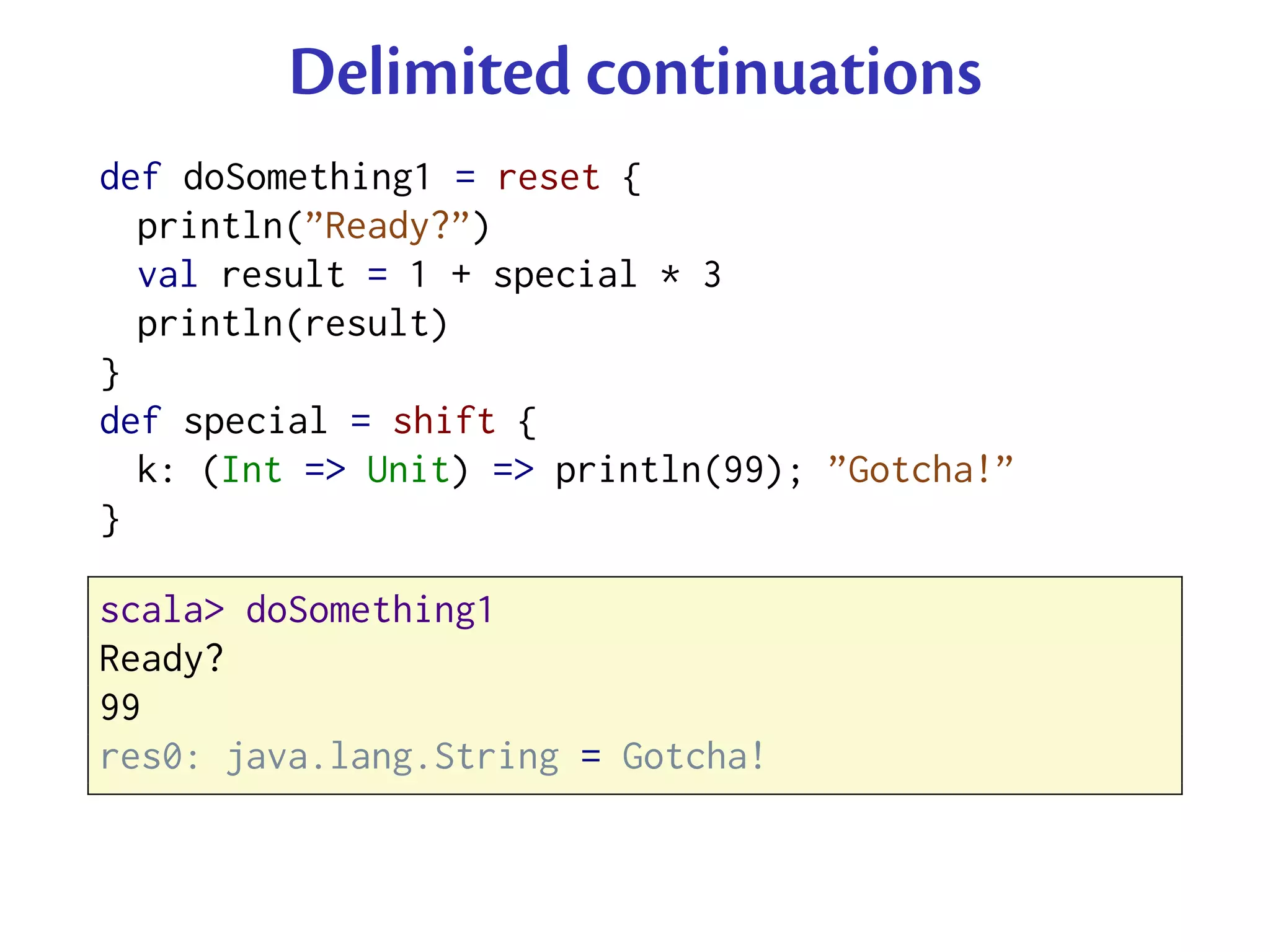
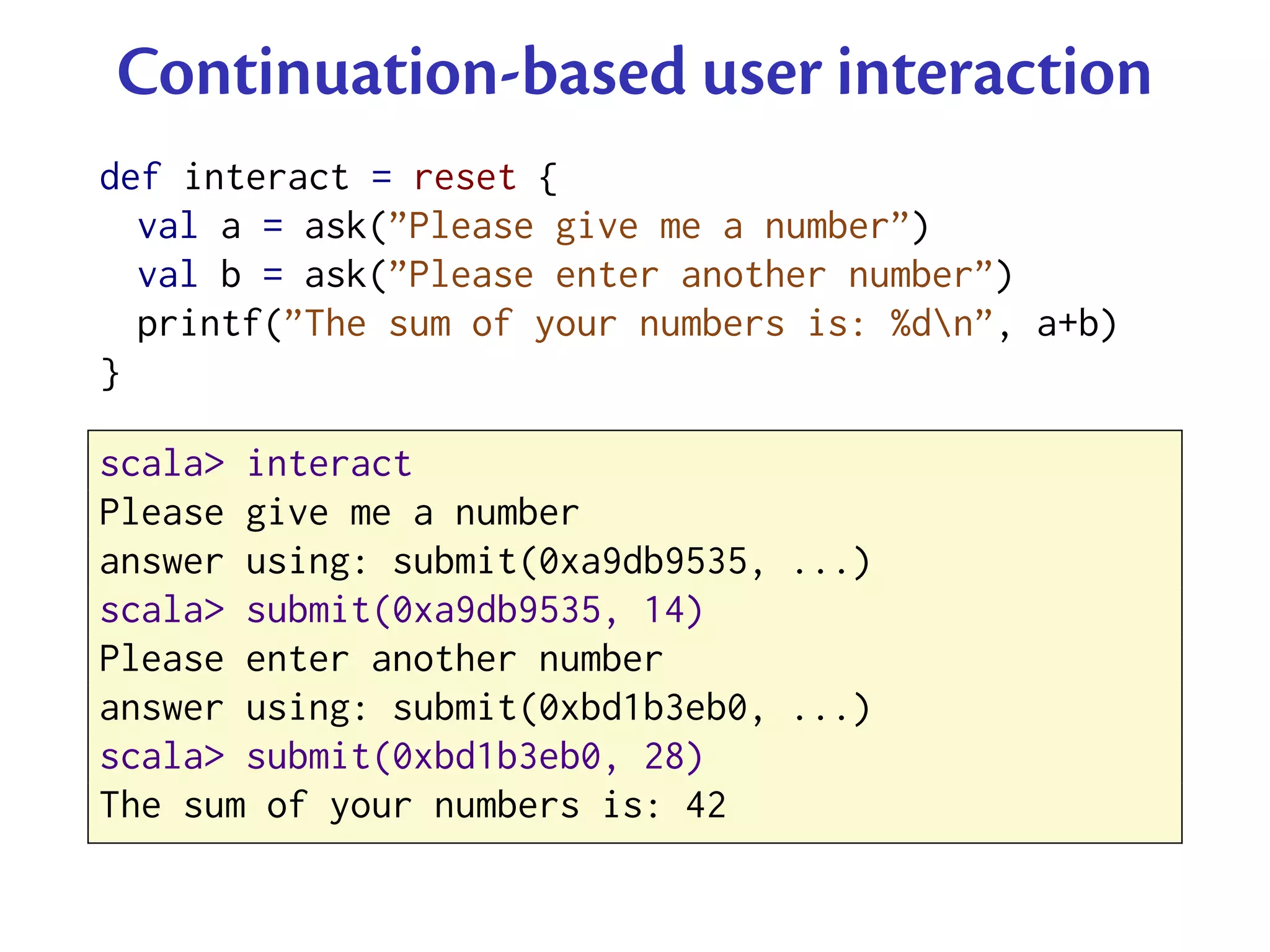
![Continuation-based user interaction
val sessions = new HashMap[UUID, Int=>Unit]
def ask(prompt: String): Int @cps[Unit] = shift {
k: (Int => Unit) => {
val id = uuidGen
printf(”%snanswer using: submit(0x%x, ...)n”,
prompt, id)
sessions += id -> k
}}
def submit(id: UUID, data: Int) = sessions(id)(data)
def interact = reset {
val a = ask(”Please give me a number”)
val b = ask(”Please enter another number”)
printf(”The sum of your numbers is: %dn”, a+b)
}](https://image.slidesharecdn.com/slides-110216164220-phpapp01/75/Scala-Functional-Patterns-17-2048.jpg)
![Pattern : Format combinators
[Danvy ]
Typeful programmers covet printf.
int a = 5;
int b = 2;
float c = a / (float) b;
printf(”%d over %d is %.2fn”, a, b, c);
Cannot type-check because format is just a string.
What if it has structure, like abstract syntax tree?](https://image.slidesharecdn.com/slides-110216164220-phpapp01/75/Scala-Functional-Patterns-18-2048.jpg)
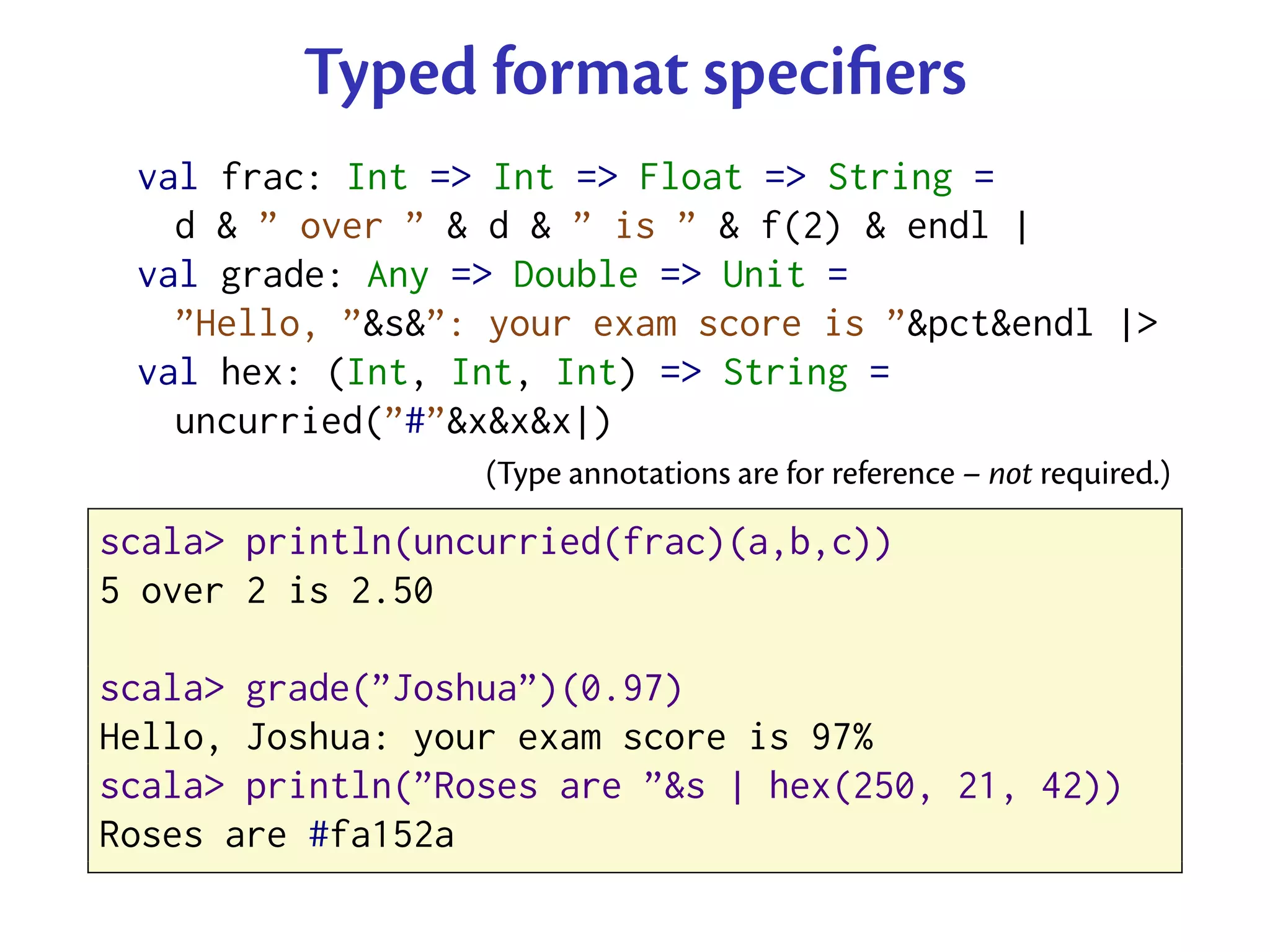
![Buffer representation
type Buf = List[String]
def put(b: Buf, e: String): Buf = e :: b
def finish(b: Buf): String = b.reverse.mkString
def initial: Buf = Nil](https://image.slidesharecdn.com/slides-110216164220-phpapp01/75/Scala-Functional-Patterns-20-2048.jpg)
![Operational semantics
def lit(m:String)(k:Buf=>A)(b:Buf) = k(put(b,m))
def x(k:Buf=>A)(b:Buf)(i:Int) = k(put(b,i.toHexString))
def s(k:Buf=>A)(b:Buf)(o:Any) = k(put(b,o.toString))
(Not the actual implementation.)
lit(”L”)(finish)(initial) ”L”
x(finish)(initial)(42) ”2a”
where:
type Buf = List[String]
def put(b: Buf, e: String): Buf = e :: b
def finish(b: Buf): String = b.reverse.mkString
def initial: Buf = Nil](https://image.slidesharecdn.com/slides-110216164220-phpapp01/75/Scala-Functional-Patterns-21-2048.jpg)
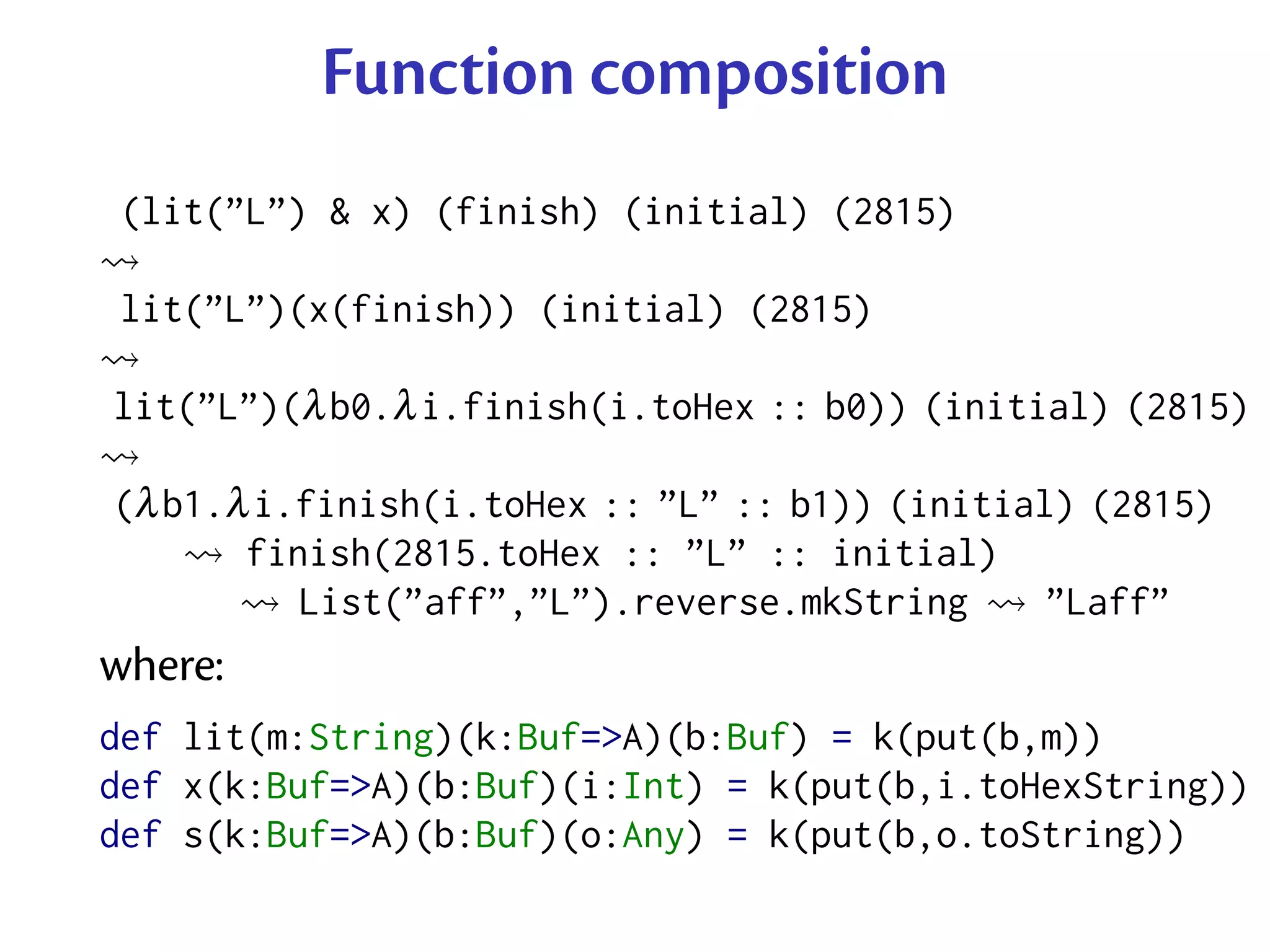
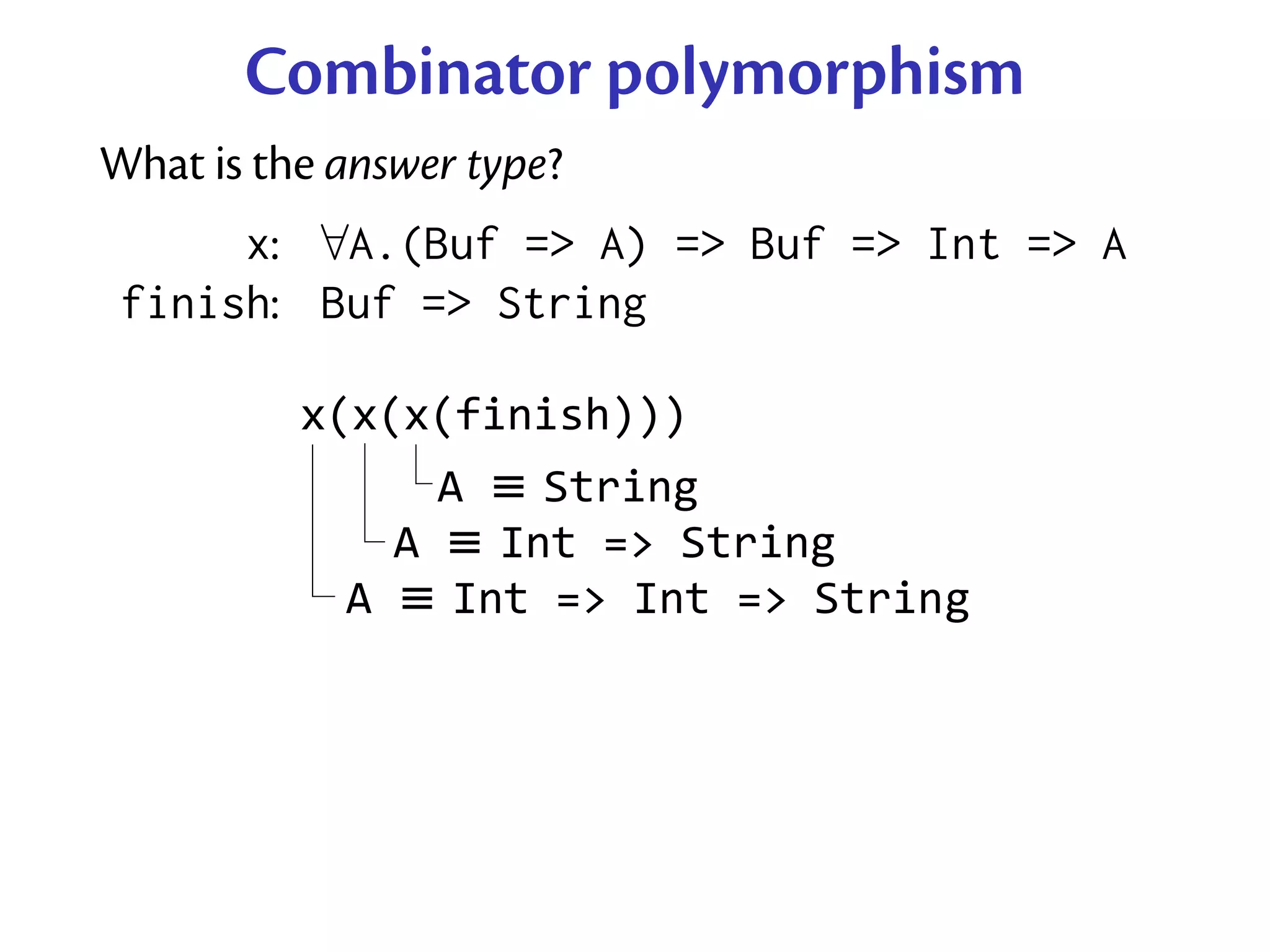
![Type constructor polymorphism
trait Compose[F[_],G[_]] { type T[X] = F[G[X]] }
trait Fragment[F[_]] {
def apply[A](k: Buf=>A): Buf=>F[A]
def & [G[_]] (g: Fragment[G]) =
new Fragment[Compose[F,G]#T] {
def apply[A](k: Buf=>A) = Fragment.this(g(k))
}
def | : F[String] = apply(finish(_))(initial)
}](https://image.slidesharecdn.com/slides-110216164220-phpapp01/75/Scala-Functional-Patterns-24-2048.jpg)
![Combinator implementations
type Id[A] = A
implicit def lit(s:String) = new Fragment[Id] {
def apply[A](k: Cont[A]) = (b:Buf) => k(put(b,s))
}
type IntF[A] = Int => A
val x = new Fragment[IntF] {
def apply[A](k: Cont[A]) = (b:Buf) => (i:Int) =>
k(put(b,i.toHexString))
}](https://image.slidesharecdn.com/slides-110216164220-phpapp01/75/Scala-Functional-Patterns-25-2048.jpg)
![Pattern : Nested data types
Usually, a polymorphic recursive data type
is instantiated uniformly throughout:
trait List[A]
case class Nil[A]() extends List[A]
case class Cons[A](hd:A, tl:List[A]) extends List[A]
What if type parameter of recursive invocation differs?](https://image.slidesharecdn.com/slides-110216164220-phpapp01/75/Scala-Functional-Patterns-26-2048.jpg)
![Weird examples
trait Weird[A]
case class Wil[A]() extends Weird[A]
case class Wons[A](hd: A, tl: Weird[(A,A)])
extends Weird[A] // tail of Weird[A] is Weird[(A,A)]
val z: Weird[Int] = Wons(1, Wil[I2]())
val y: Weird[Int] = Wons(1, Wons((2,3), Wil[I4]))
val x: Weird[Int] =
Wons( 1,
Wons( (2,3),
Wons( ((4,5),(6,7)),
Wil[I8]())))
type I2 = (Int,Int)
type I4 = (I2,I2)
type I8 = (I4,I4)](https://image.slidesharecdn.com/slides-110216164220-phpapp01/75/Scala-Functional-Patterns-27-2048.jpg)
![Square matrices
[Okasaki ]
Vector[Vector[A]] is a two-dimensional matrix
of elements of type A.
But lengths of rows (inner vectors) could differ.
Using nested data types, recursively build
a type constructor V[_] to represent a sequence
of a fixed number of elements.
en, Vector[V[A]] is a well-formed matrix,
and V[V[A]] is square.](https://image.slidesharecdn.com/slides-110216164220-phpapp01/75/Scala-Functional-Patterns-28-2048.jpg)
![Square matrix example
scala> val m = tabulate(6){(i,j) => (i+1)*(j+1)}
m: FastExpSquareMatrix.M[Int] =
Even Odd Odd Zero (((),((((),(1,2)),((3,4),(5,6))
),(((),(2,4)),((6,8),(10,12))))),(((((),(3,6)),((
9,12),(15,18))),(((),(4,8)),((12,16),(20,24)))),(
(((),(5,10)),((15,20),(25,30))),(((),(6,12)),((18
,24),(30,36))))))
scala> val q = m(4,2)
q: Int = 15
scala> val m2 = m updated (4,2,999)
m2: FastExpSquareMatrix.M[Int] =
Even Odd Odd Zero (((),((((),(1,2)),((3,4),(5,6))
),(((),(2,4)),((6,8),(10,12))))),(((((),(3,6)),((
9,12),(15,18))),(((),(4,8)),((12,16),(20,24)))),(
(((),(5,10)),((999,20),(25,30))),(((),(6,12)),((
18,24),(30,36))))))](https://image.slidesharecdn.com/slides-110216164220-phpapp01/75/Scala-Functional-Patterns-29-2048.jpg)
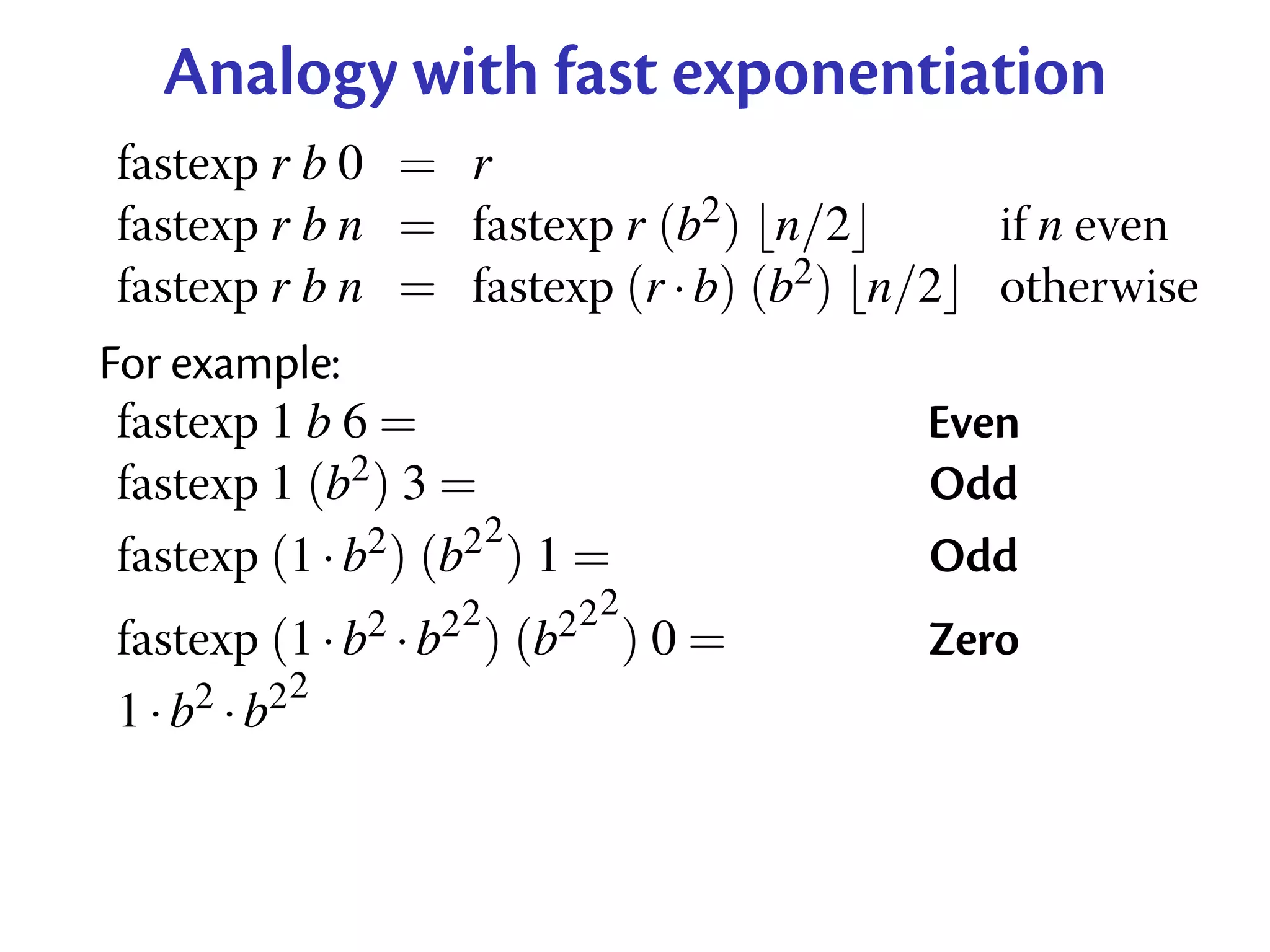
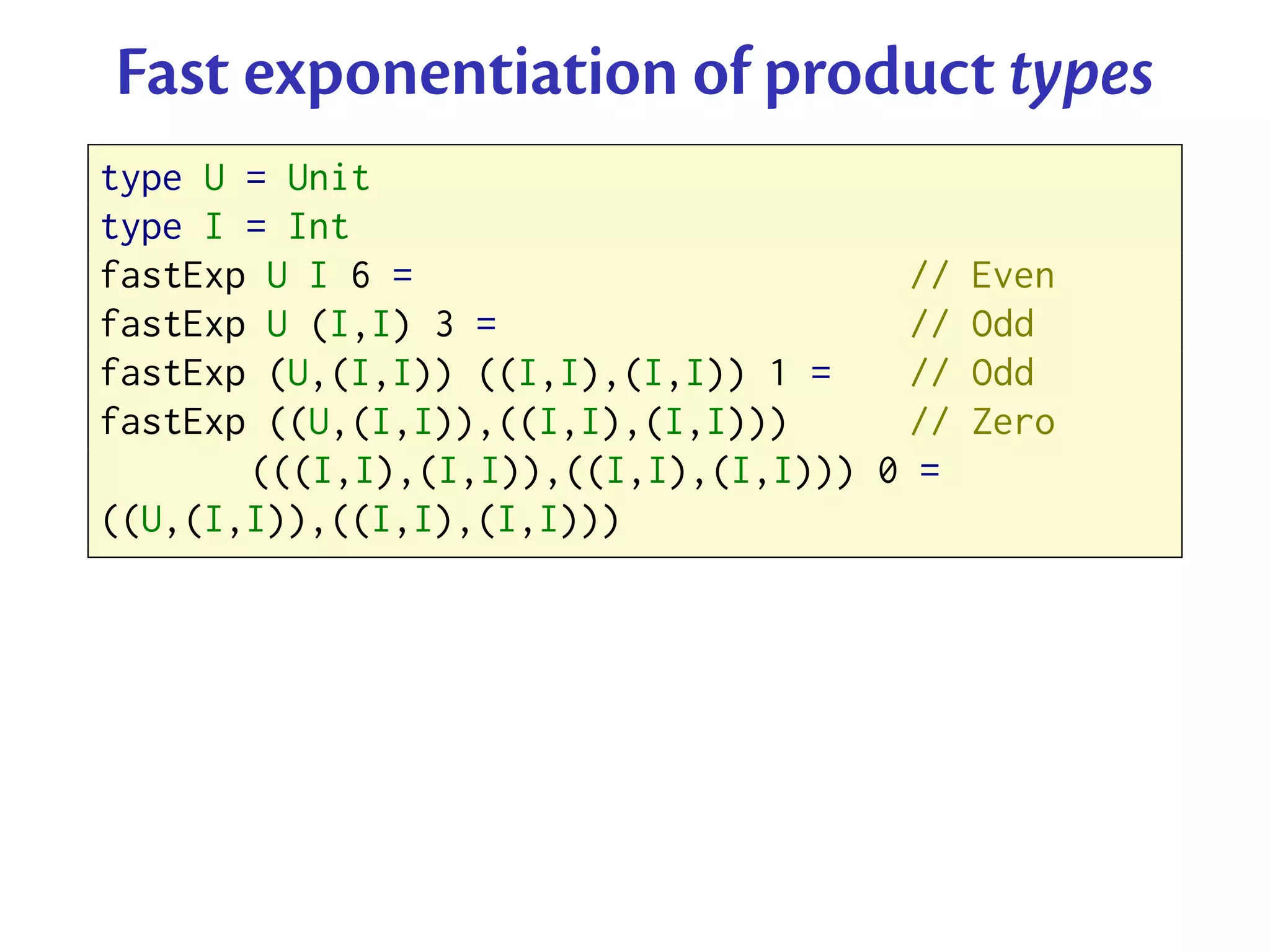
![Implementation as nested data type
trait Pr[V[_], W[_]] {
type T[A] = (V[A],W[A])
}
trait M [V[_],W[_],A]
case class Zero [V[_],W[_],A] (data: V[V[A]])
extends M[V,W,A]
case class Even [V[_],W[_],A] (
next: M[V, Pr[W,W]#T, A]
) extends M[V,W,A]
case class Odd [V[_],W[_],A] (
next: M[Pr[V,W]#T, Pr[W,W]#T, A]
) extends M[V,W,A]
type Empty[A] = Unit
type Id[A] = A
type Matrix[A] = M[Empty,Id,A]](https://image.slidesharecdn.com/slides-110216164220-phpapp01/75/Scala-Functional-Patterns-32-2048.jpg)
